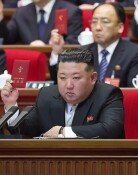Agencies Point Fingers in Lobbying Row
Agencies Point Fingers in Lobbying Row
Posted March. 29, 2006 08:01,
The Ministry of Construction and Transportation and the Seoul Metropolitan Government are blaming each other for the controversy over the construction of a Hyundai-Kia Motors research and development (R&D) expansion in Yangjae-dong, Seocho-gu.
Their denials of responsibility come at a time when the Public Prosecutors Office is expanding the scope of its lobbying investigation after finding evidence that ex-Investus Global CEO Kim Jae-rok lobbied Seoul and Ministry of Construction and Transportation officials for permission to expand the building.
The two sides are arguing over which side was more responsible for the revision of the Urban Facilities Plan that allowed the construction to take place. This is because the lobbying efforts most likely targeted the side that had more practical influence.
The land occupied by Hyundai-Kia Motors headquarters had been designated as a commercial area where only distribution facilities could be built. A series of complex authorization and permission procedures to change the plan took place to allow the construction of the research center.
Because this plan was amended in December 2004, Hyundai-Kia Motors was the only company to benefit.
The Seoul Metropolitan government alleges that the Ministry of Construction and Transportation requested an amendment to this plan on April 14, 2004, and that it responded with only a suggestion to add a clause allowing research facility construction in the area in hopes of boosting industrial activity on May 7.
Seoul City spokesperson Kim Byeong-Il said Tuesday that the Seoul Metropolitan government was only following the Ministry of Construction and Transportations suggestions, and that its decisions had nothing to do with Kim Jae-roks lobbying efforts.
To sum up the Seoul Metropolitan governments comments, it only conveyed the companys request after Ministry of Construction and Transportation suggested it do so.
The Ministry of Construction and Transportation responded by saying that only suggested a construction permission amendment after a regular inspection of the plan, and that it had never specifically mentioned a change in the clause that allowed only distribution facility construction. The ministry released documents that it had sent to the Seoul Metropolitan government to back its claim.
Ministry of Construction and Transportation city planning official Lee Jae-hong said that the Seoul Metropolitan government asked the ministry to permit the addition of a research facility allowance to the distribution facility restrictions when it amended the plan, and added that the ministry had nothing to do with the lobbying case.
The ministry also said that the suggestion of an amendment first surfaced during President Roh Moo-hyuns discussion with CEOs of major companies that took place on May 25, 2004 at the Cheong Wa Dae.
According to the ministry, the Ministry of Commerce, Industry and Energy gathered requests in June 2005 made by the CEOs present at the meeting and conveyed the ministrys suggestions on a variety of issues, including the research amendment case, and that the ministry was only responding to this.
The explanations all deny any ulterior motives and call the research allowance a revision of unnecessary regulations.
But construction industries are still suspicious of how the ministry requested a suggestion from Seoul Metropolitan Government on April 14, just weeks after the automaker requested the amendment, and of the fact that it took only nine months for final permission to add the research facility to be handed down.
An employee of a construction company said, According to Ministry of Construction and Transportation, it cooperated with the Seoul Metropolitan Government to aid the companys business activity. But the process that usually takes very long was carried out unusually fast in this case.
Joong-Hyun Park Tae-Hun Hwang sanjuck@donga.com beetlez@donga.com







